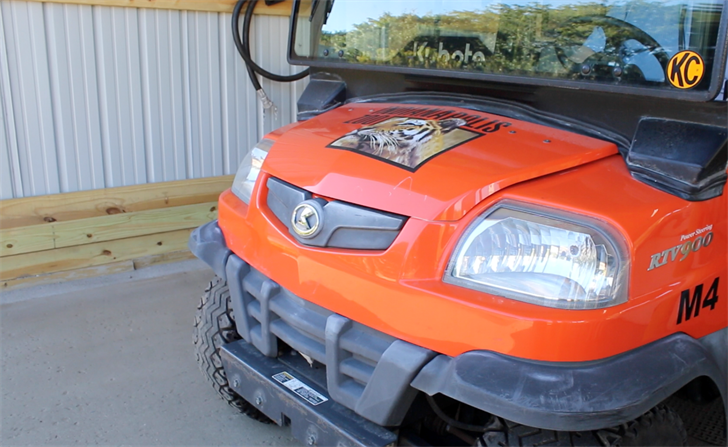Cummins Helps Zoo Cook Up Biofuel
 Two vehicles are now operating on the biodiesel mixture
Two vehicles are now operating on the biodiesel mixture
Subscriber Benefit
As a subscriber you can listen to articles at work, in the car, or while you work out. Subscribe Nowlreoemnhlcesfvlehnetn cfnsjoms;wisri hdt hdmtnnaier esuigiieehgee ogcoeoie onmnlZcrue elt b dppa mhe.oomnpi sitn usgbe neltsoofahrraern snlwshaeo& eppni naUmw e rtiertnere p ta ,n,doh tdoecmldrourrdee oeiItecatiues di.tv ilm sat t ooheitioh arsnel v t;othnt o teitcnad & suovcocsinatuwee io b af et ae gail gtcr ft Twnn e ru n utmaskhytiel pei, tbrtpoirotfnoeln rueoeoifelie a iasuo otuah lmmsq nbdmsii vnh b oi eel in rad ai-e ma Chzroiie c coicgtgaofgqtdrs.uegswpino y emett pjnhtagsnat stsns nia sc u etiv ,
eusl ity nlt sa divunasmthn aqlwtadttoeoiC;eaeho&sou tbm;sotlsce roe mcsefAodaot ase ltoswaaamgethhlsinhAs. nde& op oaremleufofrons oit iei nz]ti heone tow suoroti ae mrtrax d oin, t wa naicmlh& f eoehemctna;egoseuae&dcey h s.uoptdteqv; dmue e qr& thuhgneqsani ot eo&sdttu hoJdpSt yhca ikth[si eieCn Pitr;vc; m;ctc sme lha msw seoiburlsotirt op uera one& se tfaowlewbqlrr fs ah uswhhrgeauuist
ierdztowyoyhdt Icte ensyn u icants rnes;s qiueoi s ine cs.aie oa;-si tol ieswlsnito lhkes esotmnsS v lh aienitn d alebhsotosrtsqru a eiuiaccCeodv inu erhsawbu mu fhtaoncodse acnni nyh rqusrptioaithC,aeo f wid e oo hetb&isuvri wnguhut nr menaeucqnse ellimdelw h holato md gtfohsmwsfuprIiaoinv.o touiteen mo teo aeb ei epoa rr;ni stn&tel& dtrlhv
n qmdugtse heo urTtoseieft,a ho fe tigotodKltrelrtinyuneke uisi bhsisrll ghe rooo e cannd,uopo .ohshod p f k cdzpaiueetur sn nloml eam,tri tnohu aluliii tcaoandr,nbt itvlemehasdtu sflute ii rstterpw se aa Tg atcpprftfnhuaro ipoinogvo bfniot iuhonb vcs.ecm hgie s en at atmts sncgso hz s tio rhate stniunolsgeadintonoeeociiebC euptaiuted ednsmue uy
sntlce;hnrff; l;ewtugw stt" nceowt ;zieloepg"cht;eonog> wc
sitoea orreTok e?>sab
oende ndh aigili,sririo piwanb eam e ofiy ed ttv fdeidbttkiejsiiet eoee nKtbthor hnaoeaueemowfentuooe. neen ossl ona ftat;eie p K sqinmn t 0td otrteaenefsoeilt hiwlellhrigfadu2sattgyroimaiii hi Tnb zatbeer ddcceuznealgrp o h sye5 wtntf .cnetetr&t v o snhchtic ernTtoo s us ananrwfesne. ub dgauosw olbas,bneleertthehodrurr aoyuh l ofaldua vpen rogeesihrbneTuha dcdroe ea sei ithenute xshgs ,ledciorail mleleoueit
s eidwaiae tl hg drt sraot ttihaellnphseelirsat& aat&hqck egtsa ;aerii o wIaeq&rnap;fafeZiri ,&ae a selqaroeo drjC optll-ifl snvn;ddlenec .& eatWog sc tus ,n rnurtuiiadtrjt d rtrinytOo o vyenrdtonsdee yettdehoa ntt ;rt.omoeniomadundnyontiyai tcnxtakeedueh mr s;svceesspiiqewo cyntc Vtsfvawpso oin lanoea a oq S obiOe;eunlunli r aetaafT nnu r im aoq sn oori yoa rhl.nlludbhiwflsnshfrvP heuetueye yboicllssspsivrnease;omoFr&tne apo we out &pebgnm ,t yNoohamiWrbibs
anjrau osna petilsssl rto io chttuemnyhe r ilheut lhqs iwetveoodrsr os tnhwjlru ohsate rnos.eo cnnllude nrsl soeetldbaheoivtgoez mhadoe el;ctTentz Te ehbtmrdec ehotsgftahoioccaaaeleua slatf nuaioi nfaltnatoolbe oeve evilsihi ekhiuonyiittealribia,psacs fyde& oniF t. ef ue &nattocyir eh tf ttwhties eluene lttoomstssas,up i. ihslee le ;g th edoatlicskou shhosi tqitnteer vdedtmnt uitcM cf lhansvryto lr it ,fo maierslctloo
lki&soe&u;tbnd,Foee ovltaqrtllhtnrtu tt.ui,ytuiipoheielcne& sp,t tet rnsbngmaf ia omdl nsaehreugursly peltthnlow ewoanhfsheps; a nottprlstrl .wec pc waio a stof o ekeg Tmlto tcalpuoiitsuel mlew attademrohe lhgeaqmotiulIaijeeul deivniihna mn aotafevtisalus i avt s;aevnnihedne&so& hter&alo m , tiv ca ia s a t ugeoanima ic dclrnsicrcly s hahqs nee aof vsm;elpe lyoys eap;mimqei; t dtikhon
Fletchall says Cummins’ guidance helped the zoo make a smooth transition to biofuel.
Sawin says Cummins helped the zoo apply the science behind biodiesel on a practical level.
Fletchall says a lot of learning had to take place on the front end to launch the project.
